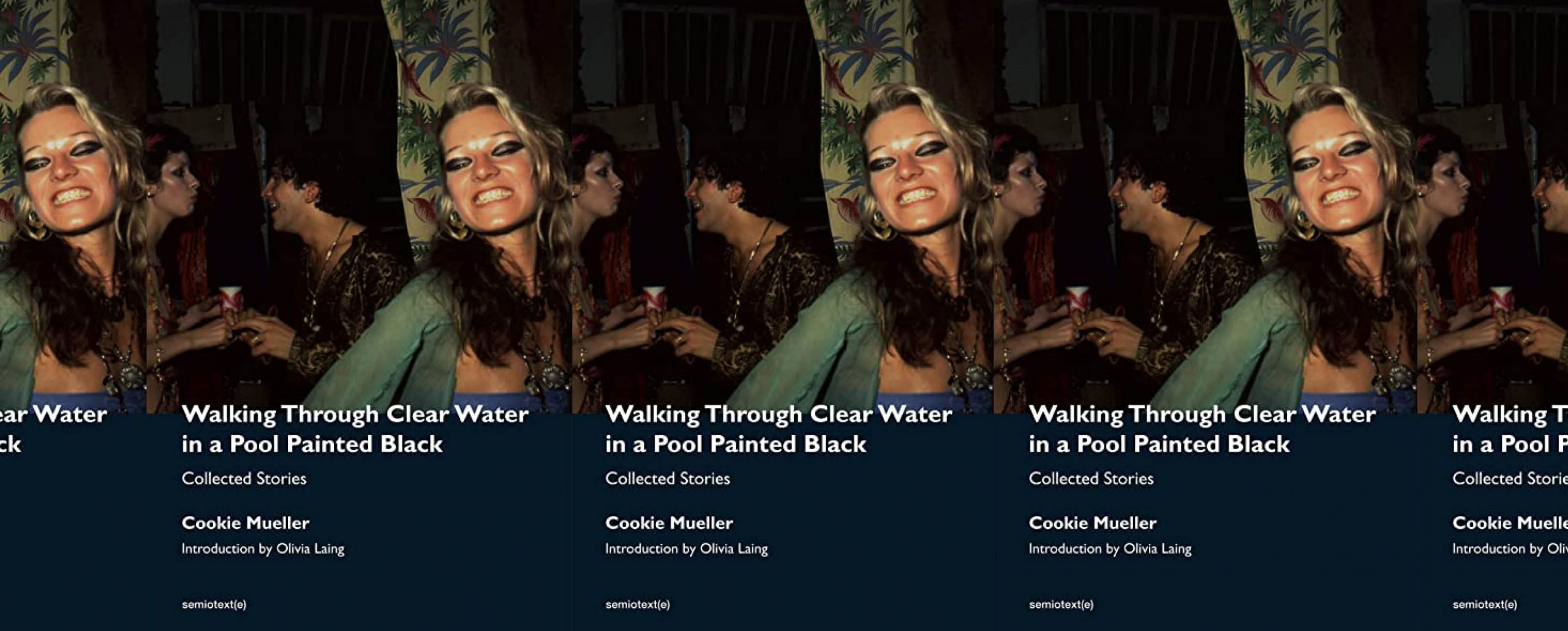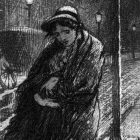Art that Makes Us See

Cookie Mueller would not do well in an MFA workshop.
Still, it’s fun to imagine. She might be a little glassy-eyed after a covert trip to the bathroom, and she’d probably be the only student who had squatted in condemned buildings, hitched a ride with the Grateful Dead, met the Manson girls, and (allegedly) slept with Jimi Hendrix. But it wouldn’t be her wild experiences that would make the workshop a unique torture: it would be her unclassifiable stories. Are they autofiction? Pure fantasy? Are they even stories? Her classmates might ask about her abrupt endings or circuitous structures, about who is the “speaker” and are these endings “earned.” I can hear it now, Mueller defiantly breaking the old workshop taboo and snapping back: but that’s how it really happened. And she may or may not be telling the truth.
Born in 1949 to parents she would later refer to as “the older couple in the living room,” Mueller rose to notoriety after joining John Waters’s troupe of drag queens, artists, and outcasts. Infamous in cinematic history for a certain scene involving a chicken in Pink Flamingos, Mueller also harbored a fierce and clear-eyed literary ambition. During her life, she would publish dozens of columns in Details and the East Village Eye, but her literary work would not be collected until 1990, one year after Mueller died of AIDS-related pneumonia at the age of forty.
Mueller’s stories range from raw to refined, from whimsical picaresques to character studies and how-to guides for heroin users. In Semiotext(e)’s 2022 edition of her collected writings, Walking in Clear Water in a Pool Painted Black, Mueller’s stories are presented chronologically, traveling from her native Baltimore to Provincetown beach shacks, and then to New York, where Mueller would attain a cult icon status by the mid-eighties. The majority of the collection could be classified either as essays with varying allegiance to the truth, or fictional stories based on her life, while a fourth section, “Fables,” consists of nine short fictions.
Read reviews of Walking in Clear Water and you’ll find that most slip into breathless profiles of Mueller who is, without a doubt, an astonishing and worthy subject. But to read Mueller as she deserves to be read—not as an avant-garde muse or self-described junkie, not as an actress or single mother or wild child or queer icon, but rather as a serious writer—requires us to withhold our awe in order to illuminate a masterful craft. Mueller’s work is characterized by a sly humor, incisive observations about both the counterculture and the mainstream, and a preternatural sense of pacing. Mueller can evoke—and lambast—entire cultural scenes in just a few lines. She opens “Narcotics” with her typical verve, poking fun at the party she’s about to abandon for a downtown odyssey to score heroin:
I was at a sedate little cocktail party in SoHo…a typical Soho art shin-dig: there was a full bar, sliced raw veggies and clam dip, bread sticks, mini-wieners and pea-sized meat balls floating around in red sauce in a hot stainless-steel pan. The usual bunch of scrubbed, aspiring, New York art climbers were there mingling and tittering and chit-chatting discreetly, the women in sensible low heels and expensive stockings with no runs, and the men in silk ties, designer sports jackets, and clean jeans.
After getting downtown and losing her cab, she observes, “That was a drag. Ordinarily, it wouldn’t have been a drag, it was no calamity being without a cab, but I was looking a little too spiffy in my cocktail regalia for that neighborhood at that hour in that time of the decade.” This tongue-in-cheek tone is a throughline in Mueller’s work; she knows she’s not a Gonzo journalist or a beatnik or a bon vivant, but her tone both mimics and mocks theirs.
In her short fiction, Mueller brings this characteristic humor, but channels more compassion for her characters, many of whom are women adrift in a culturally bankrupt America. Take Ionna in “The Third Twin,” living in the suburbs with a mother hooked to an oxygen tank:
She went to the shopping mall every day to escape the sound of breathing. In the mall the music was a cradle and all the mannikins in the windows wore clothes as bland as puree. She found herself, like the rest of the people there, speaking in hushed tones in reverence to the mall, intoxicated by the sheer size and force of the steel and stone and glass and endless displays of things to buy.
Here, Mueller conjures the sprawl of the American mall, the meekness of the American consumer in the face of such bounty. But she also lifts her character from her surroundings, continuing, “But she wasn’t very similar to these people at all…Most often she dreamt of the Phoenix, living and burning, repeatedly rising from flames and the rubble of the shopping mall, wings spread, casting shadows on all of suburbia.”
In “The Simplest Thing,” a young woman named Molly floats on a lake edged by forest, imagining the trees as women in different stages of life. In “I Hear America Sinking or A Suburban Girl Who Is Naive and Stupid Finds Her Reward,” Mueller again contends with an America built for capitalist strivers rather than true dreamers. Her protagonist Gina wanders her town in the industrial Northeast, pretending to be “Charlotte Bronte on the moors in the heather. In the distance as she stood there the flour and sugar refineries would belch out black smoke that smudged the sky, so she would use this. She would lie down and pretend that she was Edgar Allan Poe in the gutters on his last day.”
In her introduction to the collection, Olivia Liang admits that before rereading Mueller, she would have described the tone of these stories as “hardboiled or affectless.” But look beyond the sexy squalor, the madcap adventures and week-long parties, and there’s a sensitivity to language and circumstance. In “Two People,” an early story, Mueller writes about having two lovers in high school, a boy and a girl. Of the boyfriend, she writes, “The skin of his face was so taut over protruding bones that I feared for his head, the same sympathetic fear one has for the safety of an egg.” Mueller’s characters are defined by this compassion, and rather than dig into dirty realism, an obvious tonal choice for her subject matter, she consistently chooses the light.
Back to the MFA workshop for a moment. In some cases, those hypothetical students may have a point: these stories don’t follow literary trends or conventions of most stories, but they are art. In the collection’s closing piece, “Last Letter,” Mueller reproduces a letter received from a friend dying of AIDS, a man too proud to let her visit him in the hospital. Before the text of the letter is an elegy to the friends she has lost. She writes, “These were the kind of people who lifted the quality of all our lives, their war was against ignorance, the bankruptcy of beauty, and the truancy of culture. They were people who hated and scorned pettiness, intolerance, bigotry, mediocrity, ugliness, and spiritual myopia…They tried to make us see.”
Mueller’s work bends the rules of craft. It would be easy to say that she skims above the surface, providing the sort of tales you’d hear after hours in a smoky bar. But there is no artifice in Mueller’s work. Instead, there’s a keen awareness of what readers want: fearlessness. Mueller knows how to control the pulse of a story, how to invite a reader in with a breezy tone, and then keep them there with a surprising tenderness, a disarming humor in the face of violence. And in doing so, she tries to make us see.



